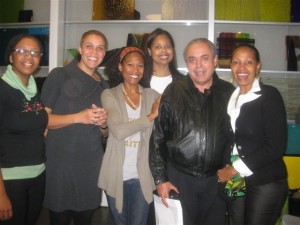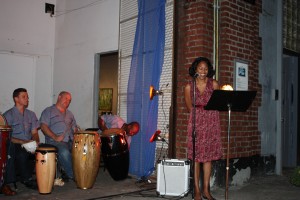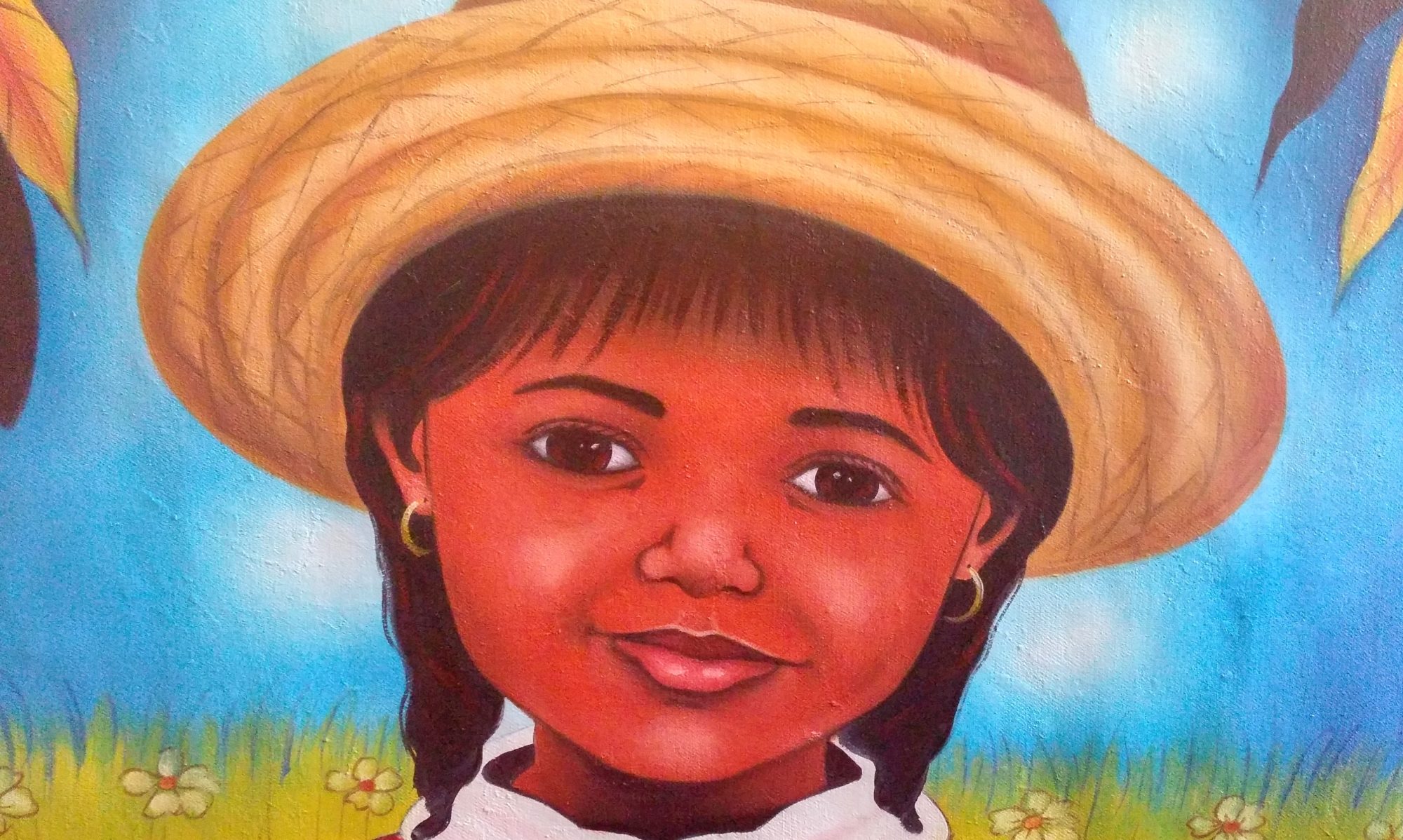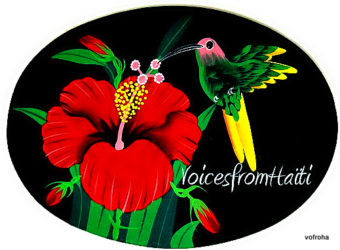Régine: I have three children: two girls. Haiti Cultural Exchange is my third child.
The idea for HCX had percolated in my mind for a long time, but it was not until 2009 that we launched it officially. Seven of us co-founded the organization; we worked as a team to formulate the goals and where we want this to be.
We have been working consistently since that time to develop and present Haitian culture to our target audience throughout New York City and the Tri-state area. We are reaching a larger audience than anticipated. People come from New Jersey, Connecticut, even Virginia and Maryland. We are pleased about that.

HCX is multi-disciplinary organization. Our events range from readings of literature by seasoned and emerging writers; we present music from the world-famous to the just starting out. Our programs with the school are popular. We believe in preserving the culture as well as showing the contemporary side. Our emerging artists are tomorrow’s greats. We must nurture them.
Also, our vision is to have a Haitian cultural center inNew York. There are a few inMiami, but in the NY area, there is not one place where the community can come together and be exposed to the richness that is our culture.
Many feel it is a tremendous void. I want a place where I can go to see film, art—a place where I can take my children for Haitian paintings, authentic dance, food, and a bit of ‘Krik? Krak!” I am certain many other persons feel the same. Because of the funding issue, HCX is quite far from having our own center; however, our hearts, the drive, the vision are definitely there. We will reach our goal.
We have a beautiful culture. There’s so much to be proud of. There is a lot for the children to learn from those of us who still remember. If we don’t teach them now, we stand to lose so much of who we are and we will alter who they will be. The future will not include authentic Haitian culture.
We talk a lot about where a good place for the center would be. We imagine it being inBrooklyn, of course. There’s a huge community here and inQueens. We want it to be accessible to a wide audience.Brooklynwould be ideal. However, if we were given a location inManhattan, we most definitely would not turn it down.
If you are in town, come to one of our programs. Find us on the Web. Get to know us. We are here for the community. However you can support HCX, do.
On Living in Haiti
My mother is one of seven children. I was born inBrooklyn—in the Flatbush area. The, moment Jean-Claude Duvalier’s regime ended, my family went right back toHaiti. I spent my formative years inPort-au-Prince, in the area called Pacot. My mother is from Les Cayes; those are the areas ofHaitiI know well. We also have family from Saint Louis Du Sud. Port Salut is gorgeous. Beautiful country!
It was an interesting time when I was there. Duvalier had just fallen. There was chaos, but there was also a lot of hope for something better. I must have lived through 6 or 7 coups d’état. The military just would not let go. My family, I think, had a lot of hope things would be different.
I was completely immersed in Haitian culture. Some of my cousins who had stayed in the States when my family returned toHaitiwere different. It’s easy to discern the difference between us. It’s not that Haitian culture isn’t important to them; it is, absolutely. There’s just something substantial yet inexplicable that becomes part of the Haitian who is immersed in all aspects of Haitian life. It’s not enough to be fluent in Kreyòl, listen, and dance to Konpa or Racine music; It’s not enough to eat griyo, pate, and banann peze. WhenHaitiis more than an integral part of who you are, there is an ‘other’ sense of being that you’ll find difficult to express. It’s just there, and recognizable only by those in whom the same inhabits. It’s a Haitian thing. . .
When I returned to theUnited Statesto attend college, I would go back home at least five times a year. I could not stay away. I recall times here when I craved something authentically Haitian, but could not find it. This led me to go home and bring Haitian arts and crafts toBrooklynin the year 2000. It was a small business; I was young, but I saw there was a deficit when it came to finding a place to get a beautiful metal sculpture or an affordable piece of art. People seemed starved for that; I completely understood.
The idea for HCX must have started then. I’d always worked for non-profits. I worked with the New York Women’s Foundation, and loved being a program officer. But the idea of working to promote Haitian culture consumed me. I knew deep within that I was supposed to be involved with it somehow. There needs to be one place where we Haitians can go, and feel completely nurtured. We’re not lacking in terms of artists, but there’s no organization that is pushing them forward. Our artists are mostly on their own, struggling.
We want to be able to be a support to them. We want to be a place where they can come and flourish; we can present their work on a more consistent basis. Furthermore, it is a lot easier for one organization to communicate with another. For example, theBrooklynMuseumwill contact HCX if they’re organizing Haiti Day. I can then contact artists and put them in touch with the necessary persons. The New York Historical Society is doing something next year regarding the revolution. They contacted us to make the connections and put them in touch with the various artists. There’s a flow that carries among us, making the experience fluid and beneficial for us all—mostly, however, it keeps Haitian Culture thriving. That is what we want.
We have a 3-day film festival coming up in November. The last one was in 2004. There have been films screened, but not a full festival. We’ve been viewing films, see what new ones are out there. The lineup is going to be amazing. I’m a little scared. It’s a 3 day event, but I think we’re going to be okay. This will place at MedgarEversCollegeNovember 19 and 20 with an opening night gala at the BrooklynMuseumon November 18.
 The Next Step for Haiti Cultural Exchange
The Next Step for Haiti Cultural Exchange
The next step is to meet with key folk in organizations inHaiti. We want to build a bridge that will allow us to bring artists here, send artists there—have a real exchange program. Until we have the funding available for that venture, we are prepared to work with existing organizations that bring artists to theUnited States. We would work with those artists while they’re here, give them more exposure. We can, for example, schedule an ‘An n’ Pale’ in conjunction with whatever else they may be doing. We have to work together to get the word out. I don’t think too many Haitians inHaitiknow that HCX is here. They can write to us. If they’re already coming on tour to a place likeBoston, for example, we can organize something around their schedule.
Part of the reason I believe HCX has been so successful is the idea of the konbit. We reach out to organizations, we reach out to individuals. We constantly strive to broaden our community. That’s why I tell people to let me know if they have an idea for a program. We might not be able to implement everything, but people need to know that Haiti Cultural Exchange is for them. This is their organization. The board is here to make sure certain things go a certain way, but in reality this organization belongs to the community.
We plan to support more programs inHaiti. That is very important to me. We’re not there yet as an organization, in terms of funding, etc. but the goal is on the radar. I hate to say this, but it’s been close to four years since I’ve been back home. Perhaps this is why it is so urgent to me to have this cultural center here and one also inHaiti. We have to be involved inHaitijust as much as we are here. We have to carry the culture on either side.
Preserving the culture for future generations is a must. There was a time when plenty of families returned toHaition a regular basis; their children lived dual lives; they knew how to negotiate both places. During the last few decades, that changed. Haitian people stayed away because of all the political upheaval, violent kidnappings, and the like. People continue to return, but not at the same rate and with the same enthusiasm.
Régine on the Earthquake
Devastating.
But let’s face it: the devastation was there prior to the earthquake. The earthquake compounded what was there. We have a lot of work to do. We have a lot of outside influences that sometimes get in the way of what needs to be done. I am not the one who will say we don’t need help, because we do. The road that we’ve taken has led us to many wrong turns. We have to do a better job, at least, of communicating and coming together as a common advocacy forHaiti. There’s no way you can do the work that we do and not get involved in discussions about the political situation. I am engaged in the conversation. I follow Haitian politics very closely. We have a lot of work to do.
Katia D. Ulysse: What do you say to those who argue that Haiti doesn’t need music, dance, or literature right now. The people need food, infrastructure, schools, clean water.
Régine: We do need those things. We do need to return to self-sufficiency in terms of our farms. We need clean water. But our Haitian culture is indispensible. It’s an integral part of who we are. Cutting that out is tantamount to losing our hearts.
There are those who get on the planes with pockets full of cash and promises for more. This status gives them power, and they flaunt that power in the people’s faces when they reachHaiti. They show up with a lot of arrogance. That arrogance hinders rather than helps. We have to be careful not to do that. We can’t profess to know all that’s best for Haitians.
So many go there with such a know-it-all attitude that the people are having a hard time even paying attention anymore. In a sense, the ‘helpers’ created hurdles for themselves—all of this in the name of charity!
We need to listen to Haitian people on the ground. Ask them what they think the solutions should be. Right now, everyone is telling us what the Haitian solutions should be. Ask us what we think.
We need to step up, anyway. We’re allowing others to define us. We are allowing others to put words in our mouths. There’s been too much of a void. We need to raise our voices. We need to take those leadership roles and let people know we’re there. We can’t blame outside forces all day; we need to stop doing that. We’re here doing work, too. More Haitian voices need to be heard.
It’s not altogether wise that other people are shaping our agenda. We have to be accountable.
People complain “They’re taking over our country.’ That’s not always true. No one can take what you don’t give. We have to open our mouths and make ourselves heard. We have to take up space. When other voices are not serving us properly, we need to raise our own. It’s our responsibility. Each of us.
I may not have the power to influence great numbers, but I have to do what I can—and that is to move the culture forward. That’s what Haiti Cultural Exchange is all about. And I thank you VoicesfromHaiti for this InnerView. You are moving the culture forward, too.

